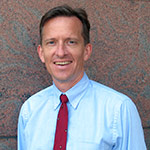Steven C. George, MD, PhD, has been named chair of the Department of Biomedical Engineering at Washington University in St. Louis, effective July 1, 2014.

George is professor of biomedical engineering and of chemical engineering and materials science at the University of California, Irvine. In addition, he is the Edwards Lifesciences Professor and director of the Edwards Lifesciences Center for Advanced Cardiovascular Technology. Previously, he was the founding William J. Link Professor and chair of the Department of Biomedical Engineering at UC-Irvine from 2002-09. He joined its faculty in July 1995.
“We are very fortunate and extremely pleased to have attracted Steve George to our biomedical engineering department,” said Ralph S. Quatrano, PhD, dean of the School of Engineering & Applied Science and the Spencer T. Olin Professor. “His expertise and accomplishments across many different research areas represented in biomedical engineering, as well as a PhD in chemical engineering and an MD, will allow him to move across interdisciplinary boundaries bridging the life sciences, medicine and engineering. Also, his administrative experience as a department chair and experience with directing PhD trainee grants and research centers will be extremely valuable to the department and the school.”
Larry J. Shapiro, MD, executive vice chancellor for medical affairs and dean of Washington University School of Medicine, said the School of Medicine has enjoyed a close working relationship and a very productive collaboration with the Department of Biomedical Engineering since its inception.
“Steve George is the ideal leader to continue and enhance this cooperative effort,” Shapiro said. “He is trained as a physician and understands at a fundamental level the important challenges facing medicine and the life sciences. His leadership style will be very conducive to continuing the ascent of the biomedical engineering program at Washington University.”
George succeeds Mark Anastasio, PhD, who has been interim chair since July, when Frank Yin, MD, PhD, stepped down as chair. Anastasio will continue as interim chair until George’s arrival.
“Mark has done an outstanding job as interim chair,” Quatrano said. “He will work closely with Steve to ensure a smooth transition.”
George’s research interests include tissue engineering with particular interest in creating microphysiological systems, vascularizing engineered tissues, and linking optical and mechanical properties of tissue. He has four active grants from the National Institutes of Health (NIH), including his role as principal investigator on a T32 training grant in cardiovascular technology and entrepreneurship.
With a group of collaborators, he received one of only 12 grants from the NIH to create 3-D chips with living cells and tissues that accurately model the structure and function of human organs. His project seeks to create microtissue mimics of the heart, cancer and microcirculation. In addition, he is the principal investigator on a grant funded by the National Cancer Institute through the “Provocative Questions” program. This project seeks to develop new tissue-engineered inspired models of cancer cell metastasis.
George has received numerous prestigious awards, including the National Science Foundation (NSF) CAREER Award; the Presidential Early Career Award for Scientists and Engineers (PECASE) from the NSF; the First Independent Research Support and Transition (FIRST) Award from the NIH; Biomedical Engineering Professor of the Year of 2010 and many teaching awards. He is a member of the American Heart Association, the American Institute of Medical and Biological Engineering, the American Association for Cancer Research and the Biomedical Engineering Society. He has had more than 100 papers published in peer-reviewed journals and has written chapters for two books.
George earned a bachelor’s degree in chemical engineering from Northwestern University and a medical degree from the University of Missouri-Columbia. He earned a doctorate in chemical engineering and completed postdoctoral fellowships in physiology, all at the University of Washington in Seattle.
“Steve George brings a unique set of credentials to the School of Engineering & Applied Science that will allow him to continue to build excellence in the Department of Biomedical Engineering while developing strong connections with both the medical school and departments on the Danforth Campus,” said Philip D. Stahl, PhD, professor of cell biology and physiology and chair of the search committee.
Other members of the search committee were Philip Bayly, PhD, the Lilyan and E. Lisle Hughes Professor and chair of Mechanical Engineering and Materials Science; Susan Dutcher, PhD, professor of genetics and of cell biology and physiology; Robert Mecham, PhD, Alumni Endowed Professor of Cell Biology and Physiology; Dan Moran, PhD, associate professor of biomedical engineering; Yoram Rudy, PhD, the Fred Saigh Distinguished Professor of Engineering; Andrey Shaw, MD, Emil R. Unanue Professor of Immunobiology and Howard Hughes Medical Institute Investigator in Pathology and Immunology; and Lihong Wang, PhD, the Gene K. Beare Distinguished Professor of Biomedical Engineering.
The School of Engineering & Applied Science at Washington University in St. Louis focuses intellectual efforts through a new convergence paradigm and builds on strengths, particularly as applied to medicine and health, energy and environment, entrepreneurship and security. With 82 tenured/tenure-track and 40 additional full-time faculty, 1,300 undergraduate students, 700 graduate students and more than 23,000 alumni, we are working to leverage our partnerships with academic and industry partners — across disciplines and across the world — to contribute to solving the greatest global challenges of the 21st century.